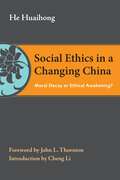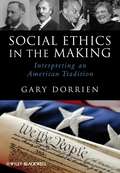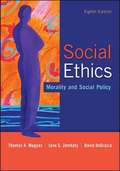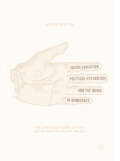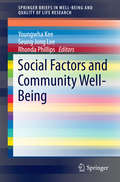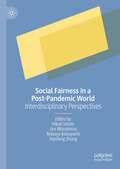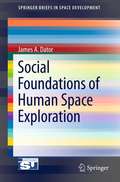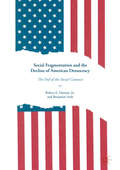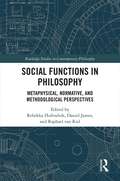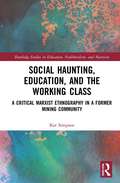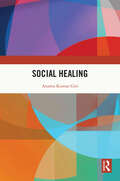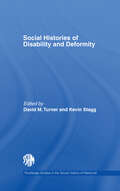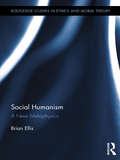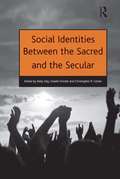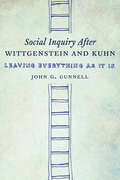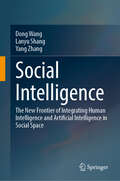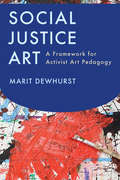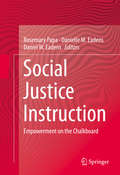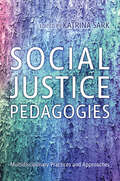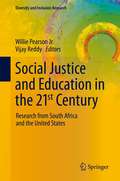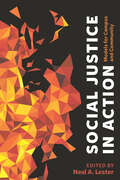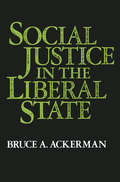- Table View
- List View
Social Ethics in a Changing China
by Cheng Li John L. Thornton Huaihong HeOver the past half-century, China has experienced incredible human dramas, ranging from Red Guard fanaticism and the loss of education for an entire generation during the Cultural Revolution to the Tiananmen tragedy, the economic miracle, and its accompanying money worship and rampant official corruption. Social Ethics in a Changing China: Moral Decay or Ethical Awakening? provides a rich empirical narrative and thought-provoking scholarly arguments that highlight the imperative for an ethical discourse in a country increasingly seen by many as a materialistic giant and spiritual dwarf.Professor He Huaihong has been not only an extraordinary witness to all of these dramas, but has also played a distinct role as a historian, an ethicist, and a social critic exploring the deeper intellectual and sociological origins of these events.Incorporating ethical theories with his expertise in the culture, history, religion, literature, and politics of the country, He reviews the remarkable transformation of ethics and morality in the People's Republic of China and engages in a global discourse about the major ethical issues of our time. He's book aims to reconstruct Chinese social ethics in an innovative philosophical framework, reflecting China's search for new virtues."The analysis of social ethics in today's China presented by Professor He in this volume is formidable. It is natural to wonder if the new ethics he proposes is powerful enough to uproot and supplant the old. "--from the Foreword by John L. Thornton"While this volume focuses on the intellectual odyssey of one truly extraordinary Chinese ethicist, it is also about the broader experience of China's journey into the twenty-first century--about the country's painful attempt to recover from its severe moral decay."--from the Introduction by Cheng Li
Social Ethics in a Changing China: Moral Decay or Ethical Awakening?
by He HuaihongOver the past half-century, China has experienced some incredible human dramas, ranging from Red Guard fanaticism and the loss of education for an entire generation during the Cultural Revolution, to the Tiananmen tragedy, the economic miracle, and its accompanying fad of money worship and the rampancy of official corruption. Social Ethics in a Changing China: Moral Decay or Ethical Awakening? provides a rich empirical narrative and thought-provoking scholarly arguments, highlighting the imperative for an ethical discourse in a country that is increasingly seen by many as both a materialistic giant and a spiritual dwarf. Professor He Huaihong was not only an extraordinary firsthand witness to all of these dramas, he played a distinct role as a historian, an ethicist, and a social critic exploring the deeper intellectual and sociological origins of these events. Incorporating ethical theories with his expertise in culture, history, religion, literature, and politics of the country, He reviews the remarkable transformation of ethics and morality in the People's Republic of China and engages in a global discourse about the major ethical issues of our time. The book aims to reconstruct Chinese social ethics in an innovative philosophical framework, reflecting China's search for new virtues. Contents 1. Reconstructing China's Social Ethics 2. Historical and Sociological Origins of Chinese Cultural Norms 3. The Transformation of Ethics and Morality in the PRC 4. China's Ongoing Moral Decay? 5. Ethical Discourse in Reform Era China 6. Chinese Ethical Dialogue with the West and the World
Social Ethics in the Making: Interpreting an American Tradition
by Gary DorrienIn the early 1880s, proponents of what came to be called "the social gospel" founded what is now known as social ethics. This ambitious and magisterial book describes the tradition of social ethics: one that began with the distinctly modern idea that Christianity has a social-ethical mission to transform the structures of society in the direction of social justice.
Social Ethics: Morality and Social Policy
by David Degrazia Thomas Mappes Jane ZembatyWith an assortment of readings and perspectives from some of the most respected thinkers of our time, Social Ethics: Morality and Social Policy provides a balanced, engaging introduction to today's most pressing social and moral problems. This highly popular anthology illuminates the issues at the heart of each contemporary problem and encourages critical, fair-minded examination of varying viewpoints--all presented in the words of those who embrace them. Helpful editorial features include substantial chapter introductions, a summary preceding each selection, discussion questions, and bibliographies for further reading.
Social Evolution, Political Psychology, and the Media in Democracy: The Invisible Hand In The U. S. Marketplace Of Ideas
by Peter BeattieThis book analyzes why we believe what we believe about politics, and how the answer affects the way democracy functions. It does so by applying social evolution theory to the relationship between the news media and politics, using the United States as its primary example. This includes a critical review and integration of the insights of a broad array of research, from evolutionary theory and political psychology to the political economy of media. The result is an empirically driven political theory on the media’s role in democracy: what role it currently plays, what role it should play, and how it can be reshaped to be more appropriate for its structural role in democracy.
Social Factors and Community Well-Being
by Rhonda Phillips Youngwha Kee Seung Jong LeeThis book explores social factors that influence well-being, as well as the relationship between these factors. It examines individual areas of social policy from the perspective of children's well-being, gender equity, and the impact of crime and social capital. The book discusses the relationships of well-being with the provision of public services, with developing a sense of community, and dimensions of happiness in nations. Bringing together perspectives from around the globe, the book provides both theoretical and applied explorations. It links the idea of influencing social factors and outcomes to community well-being, thus adding a new perspective. In doing so, it reflects the new and exciting research that is being conducted at the intersection between social factors, policy, impacts, and community well-being.
Social Fairness in a Post-Pandemic World: Interdisciplinary Perspectives
by Hikari Ishido Jiro Mizushima Masaya Kobayashi Xiaofang ZhangThis book brings a much-needed re-examination of the concepts of social fairness and justice in light of the COVID-19 crisis. Through careful analysis of issues as diverse as the allocation of vaccines through the global system COVAX, women and gender, migrants and refugees, the environment, and social justice, the authors bring novel perspectives on openness, freedom, and well-being. This ambitious collection combines political, economic, historical, philosophical, and cultural analyses to examine whether it is possible to envision a “fair society” after the global COVID-19 pandemic.
Social Foundations of Human Space Exploration
by James A. DatorThis title presents a uniquely human perspective on the quest to explore space and to understand the universe through the lens of the arts, humanities, and social sciences. It considers early stories about the universe in various cultures; recent space fiction; the origins and cultural rationale for the space age; experiences of humans in space and their emerging interactions with robots and artificial intelligence; how humans should treat environments and alien life; and the alternative futures of space exploration and settlement.
Social Fragmentation and the Decline of American Democracy
by Robert E. Denton Benjamin VothThis book explores the social and political implications of what the authors identify as the decline of the social contract in America and the rise of a citizenry that has become self-centered, entitled, and independent. For nearly two decades, America has been in a "cultural war" over moral values and social issues, becoming a divided nation geographically, politically, socially, and morally. We are witnessing the decline of American Democracy, the authors argue, resulting from the erosion of the idea of the social contract. Especially since the "baby boomers," each successive generation has emphasized personal license to the exclusion of service, social integration, and the common good. With the social contact, the larger general will becomes the means of establishing reciprocal rights and duties, privileges, and responsibilities as a basis of the state. The balkanization of America has changed the role of government from one of oversight to one of dependency, where individual freedom and responsibility are sacrificed for group equality. This book examines the conditions of this social fragmentation, and offers ideas of an American Renaissance predicated on communicative idealism.
Social Functions in Philosophy: Metaphysical, Normative, and Methodological Perspectives (Routledge Studies in Contemporary Philosophy)
by Daniel James Raphael Van Riel Rebekka HufendiekSocial functions and functional explanations play a prominent role not only in our everyday reasoning but also in classical as well as contemporary social theory and empirical social research. This volume explores metaphysical, normative, and methodological perspectives on social functions and functional explanations in the social sciences. It aims to push the philosophical debate on social functions forward along new investigative lines by including up-to-date discussions of the metaphysics of social functions, questions concerning the nature of functional explanations within the social domain, and various applications of functionalist theorising. As such, this is one of the first collections to exclusively address a variety of philosophical questions concerning the nature and relevance of social functions.
Social Haunting, Education, and the Working Class: A Critical Marxist Ethnography in a Former Mining Community (Routledge Studies in Education, Neoliberalism, and Marxism)
by Kat SimpsonBased on a critical Marxist ethnography, conducted at a state primary school in a former coalmining community in the north of England, this book provides insight into teachers’ perceptions of the effects of deindustrialisation on education for the working class. The book draws on the notion of social haunting to help understand the complex ways in which historical relations and performances, reflective of the community’s industrial past, continue to shape experiences and processes of schooling. The arguments presented enable us to engage with the ‘goodness’ of the past as well as the pain and suffering associated with deindustrialisation. This, it is argued, enables teachers and pupils to engage with rhythms, relations, and performances that recognise the heritage and complexities of working-class culture. Reckoning and harnessing with the fullness of ghosts is essential if schooling is to be refashioned in more encouraging and relational ways, with and for the working class. This text will benefit researchers, academics, and educators with an interest in the sociology of education, and social class and education in particular. Those interested in schooling, ethnography, and qualitative social research will also benefit from the book
Social Healing
by Ananta Kumar GiriSocial Healing draws on a transdisciplinary approach— bringing sociology, philosophy, psychology, and spirituality together — to understand health, social suffering, and healing in our contemporary world. It shows how we can transform the present discourse and reality of social suffering by multi-dimensional movements of social healing. The author argues for the need for a new art of healing in place of the dominant and pervasive technology and politics of killing. It discusses manifold creative theories and practices of healing in self, society, and the world as well as new movements in social theory, philosophy, and social sciences which deploy creative methods of art and performance in healing our psychic and social wounds. It explores the spiritual, social, ethical, and political dimensions of health and healing. This pioneering work will be of great interest to scholars and researchers of social theory, sociology, politics, philosophy, and psychology.
Social Histories of Disability and Deformity: Bodies, Images and Experiences (Routledge Studies in the Social History of Medicine #Vol. 25)
by Kevin Stagg David M. TurnerCollecting together essays written by an international set of contributors, this book provides an important contribution to the emerging field of disability history. It explores changes in understandings of deformity and disability between the sixteenth and twentieth centuries, and reveal the ways in which different societies have conceptualised the normal and the pathological. Through a variety of case studies including: early modern birth defects, homosexuality, smallpox scarring, vaccination, orthopaedics, deaf education, eugenics, mental deficiency, and the experiences of psychologically scarred military veterans, this book provides new perspectives on the history of physical, sensory and intellectual anomaly. Examining changes over five centuries, it charts how disability was delineated from other forms of deformity and disfigurement by a clearer medical perspective. Essays shed light on the experiences of oppressed minorities often hidden from mainstream history, but also demonstrate the importance of discourses of disability and deformity as key cultural signifiers which disclose broader systems of power and authority, citizenship and exclusion. The diverse nature of the material in this book will make it relevant to scholars interested in cultural, literary, social and political, as well as medical, history.
Social Humanism: A New Metaphysics (Routledge Studies in Ethics and Moral Theory #18)
by Brian EllisIn this book, Ellis argues that moral and political objectives are not independent of one other, and so must be pursued in tandem. Social humanism is a moral and political philosophy that does just this. As a political philosophy, it justifies the implementation and maintenance of many of the characteristic social policies of welfare states. As a moral philosophy, it provides the foundation required for most human rights legislation. To this end, Ellis elaborates on the theory of social humanism and the need to reconsider the metaphysical foundations of morals. He develops the theory of social idealism as a meta-theory for both morals and social policy, exploring the global consequences of this new approach.
Social Identities Between the Sacred and the Secular (Ashgate Ahrc/esrc Religion And Society Ser.)
by Christopher R. Cotter Abby Day Giselle VincettFocusing on the important relationship between the 'sacred' and the 'secular', this book demonstrates that it is not paradoxical to think in terms of both secular and sacred or neither, in different times and places. International experts from a range of disciplinary perspectives draw on local, national, and international contexts to provide a fresh analytical approach to understanding these two contested poles. Exploring such phenomena at an individual, institutional, or theoretical level, each chapter contributes to the central message of the book - that the ’in between’ is real, embodied and experienced every day and informs, and is informed by, intersecting social identities. Social Identities between the Sacred and the Secular provides an essential resource for continued research into these concepts, challenging us to re-think where the boundaries of sacred and secular lie and what may lie between.
Social Inquiry After Wittgenstein and Kuhn
by John G. GunnellA distinctive feature of Ludwig Wittgenstein's work after 1930 was his turn to a conception of philosophy as a form of social inquiry, John G. Gunnell argues, and Thomas Kuhn's approach to the philosophy of science exemplified this conception
Social Inquiry After Wittgenstein and Kuhn: Leaving Everything as It Is
by John GunnellA distinctive feature of Ludwig Wittgenstein's work after 1930 was his turn to a conception of philosophy as a form of social inquiry, John G. Gunnell argues, and Thomas Kuhn's approach to the philosophy of science exemplified this conception. In this book, Gunnell shows how these philosophers address foundational issues in the social and human sciences, particularly the vision of social inquiry as an interpretive endeavor and the distinctive cognitive and practical relationship between social inquiry and its subject matter.Gunnell speaks directly to philosophers and practitioners of the social and human sciences. He tackles the demarcation between natural and social science; the nature of social phenomena; the concept and method of interpretation; the relationship between language and thought; the problem of knowledge of other minds; and the character of descriptive and normative judgments about practices that are the object of inquiry. Though Wittgenstein and Kuhn are often criticized as initiating a modern descent into relativism, this book shows that the true effect of their work was to undermine the basic assumptions of contemporary social and human science practice. It also problematized the authority of philosophy and other forms of social inquiry to specify the criteria for judging such matters as truth and justice. When Wittgenstein stated that "philosophy leaves everything as it is," he did not mean that philosophy would be left as it was or that philosophy would have no impact on what it studied, but rather that the activity of inquiry did not, simply by virtue of its performance, transform the object of inquiry.
Social Intelligence: The New Frontier of Integrating Human Intelligence and Artificial Intelligence in Social Space
by Yang Zhang Dong Wang Lanyu ShangGiven the rise of AI and the advent of online collaboration opportunities (e.g., social media, crowdsourcing), emerging research has started to investigate the integration of AI and human intelligence, especially in a collaborative social context. This creates unprecedented challenges and opportunities in the field of Social Intelligence (SI), where the goal is to explore the collective intelligence of both humans and machines by understanding their complementary strengths and interactions in the social space. In this book, a set of novel human-centered AI techniques are presented to address the challenges of social intelligence applications, including multimodal approaches, robust and generalizable frameworks, and socially empowered explainable AI designs. The book then presents several human-AI collaborative learning frameworks that jointly integrate the strengths of crowd wisdom and AI to address the limitations inherent in standalone solutions. The book also emphasizes pressing societal issues in the realm of social intelligence, such as fairness, bias, and privacy. Real-world case studies from different applications in social intelligence are presented to demonstrate the effectiveness of the proposed solutions in achieving substantial performance gains in various aspects, such as prediction accuracy, model generalizability and explainability, algorithmic fairness, and system robustness.
Social Justice Art: A Framework for Activist Art Pedagogy
by Marit DewhurstIn this lively and groundbreaking book, arts educator Marit Dewhurst examines why art is an effective way to engage students in thinking about the role they might play in addressing social injustice. Based on interviews and observations of sixteen high schoolers participating in an activist arts class at a New York City museum, Dewhurst identifies three learning processes common to the act of creating art that have an impact on social justice: connecting, questioning, and translating. Noting that "one of the challenges of social justice art education has been the difficulty of naming effective strategies that can be used across multiple contexts," Dewhurst outlines core strategies for an "activist arts pedagogy" and offers concrete suggestions for educators seeking to incorporate activist art projects inside or outside formal school settings. Social Justice Art seeks to give common language to educators and others who are looking to expand and refine their practices in an emerging field, whether they work in art education, social justice programming, or youth development. "In a voice that is at once intimate and rigorous, subtle and discerning, skeptical and celebratory, Marit Dewhurst probes the layers and boundaries of what she calls the 'pedagogy of activist art.' Her voice plays in duet with those of the young artists whose discourses offer resistance and critique, insight and transparency, into the prevailing inequalities and injustices that divide and oppress their communities. Social Justice Art is a beautifully composed work of witness and wisdom, a practical and inspiring guide for practitioners, and an advance in theory and methodological innovation for researchers." --Sarah Lawrence-Lightfoot, Emily Hargroves Fisher Professor of Education, Harvard University, and author of The Essential Conversation
Social Justice Art: A Framework for Activist Art Pedagogy
by Marit DewhurstIn this lively and groundbreaking book, arts educator Marit Dewhurst examines why art is an effective way to engage students in thinking about the role they might play in addressing social injustice. Based on interviews and observations of sixteen high schoolers participating in an activist arts class at a New York City museum, Dewhurst identifies three learning processes common to the act of creating art that have an impact on social justice: connecting, questioning, and translating. Noting that &“one of the challenges of social justice art education has been the difficulty of naming effective strategies that can be used across multiple contexts,&” Dewhurst outlines core strategies for an &“activist arts pedagogy&” and offers concrete suggestions for educators seeking to incorporate activist art projects inside or outside formal school settings.Social Justice Art seeks to give common language to educators and others who are looking to expand and refine their practices in an emerging field, whether they work in art education, social justice programming, or youth development.
Social Justice Instruction
by Rosemary Papa Danielle M. Eadens Daniel W. EadensThis resource offers instructors a full palette of strategies for teaching social justice concepts across subject areas from kindergarten through college. Dividing its content between elementary, adolescent, and adult learners, the book analyzes the classroom experience as a powerful means of challenging stereotypes and supporting inclusion, respect, and equity. History, language arts, literature, and social studies, as well as mathematics and science are shown as platforms for tying critical thinking to moral behavior. And while professional development underlies all chapters in the text, special areas such as technology, curriculum design, recognizing student demographics, and raising social justice awareness in school culture are spotlighted. Among the topics covered: Reframing social justice for the adult learner. The politics of "being": faculty of color teaching social justice in the college classroom. Stories of social justice from the kindergarten classroom. Critical literacy and multicultural literature. The shaming: creating a curriculum that promotes socially-responsible online engagement. Literacy is a civil write: the art, science, and soul of transformative classrooms. For educators and education researchers involved in the field, Social Justice Instruction unlocks the potential for imparting progressive ideas along the educational spectrum. The strategies here model a humanist perspective that will serve learners both in and outside the classroom.
Social Justice Pedagogies: Multidisciplinary Practices and Approaches
by Katrina SarkSocial Justice Pedagogies provides a diverse and wide perspective into making education more robust and useful in light of global injustices and new challenges posed by new media and communication practices, media manipulation, right-wing populism, climate crisis, and intersectional discriminations. Meant to inspire readers to see learning and teaching from a wider perspective of justice, inclusion, equity, and creativity, it argues that relational and mindful approaches to teaching and learning in specific contexts, settings, and place-based experiences are essential in how we determine the value of education. The book draws on contributions from scholars and experts who incorporate social justice into their teaching practices in different disciplines in universities across Canada, the US, and Europe. Social Justice Pedagogies uniquely presents a wide interdisciplinary perspective on social justice in education practices in order to speak to the ways in which we all want to make our research, our classrooms, and our institutions more just. It argues that pedagogy, and specifically teaching and learning, constitutes a process of building relationships between people and knowledge by fostering a learning community.
Social Justice and Education in the 21st Century: Research from South Africa and the United States (Diversity and Inclusion Research)
by Vijay Reddy Willie Pearson Jr.The world is not an equal place. There are high- and low-income countries and high- and low-income households. For each group, there are differential educational opportunities, leading to differential educational outcomes and differential labor market opportunities. This pattern often reproduces the privileges and inequalities of groups in a society. This book explores this differentiation in education from a social justice lens. Comparing the United States and South Africa, this book analyzes each country’s developmental thinking on education, from human capital and human rights approaches, in both primary and higher education. The enclosed contributions draw from different disciplines including legal studies, sociology, psychology, computer science and public policy.
Social Justice in Action: Models for Campus and Community
by Neal A. LesterAddressing both veterans of justice work and novices seeking points of entry, the essays in this volume showcase practical approaches to diversity, equity, and inclusion: ways to build community, earn trust, tell unheard stories, and develop solutions to problems. Emphasizing values such as empathy, self-reflection, and integrity, the volume is rooted in humanities work but also features contributions from fields as diverse as the performing arts, architecture, and evolutionary biology and represents settings beyond the college campus, such as schools, libraries, museums, and prisons. While bringing insights from higher education, it critiques the system as well, exploring the ways that institutions reinforce power structures and exclude marginalized voices. Interspersed with the essays, brief reflections by activists and artists offer testimony and inspiration.
Social Justice in the Liberal State
by Bruce AckermanCertain to become the most important work in political theory since John Rawls's A Theory of Justice, this book presents a brilliantly original, compelling vision of a just society-a world in which each of us may live his own life in his own way without denying the same right to others. Full of provocative discussions of issues ranging from education to abortion, it makes fascinating reading for anyone concerned with the future of the liberal democratic state.
